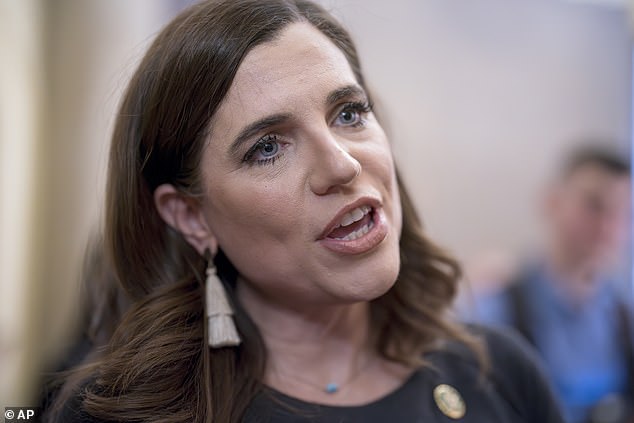Republican Rep. Nancy Mace built a growing list of Republicans who balk at the cost of the debt ceiling agreement Speaker Kevin McCarthy has with President Biden.
“The Republicans have been outsmarted by a president who can’t find his pants.” “I’m voting NO on the debt ceiling debacle because it’s not worth playing the DC game and selling our kids and grandkids,” said the South Carolina Republican on Tuesday when announcing her position.
The Debt Limit Agreement provides for $136 billion in budget cuts and suspends the debt ceiling until January 1, 2025, after the 2024 election.
It leaves discretionary non-defense spending unchanged in 2024 and allows for a 1 percent increase in 2025 — essentially tantamount to cuts since inflation isn’t accounted for.

Republican Rep. Nancy Mace built a growing list of Republicans who balk at the cost of the debt ceiling agreement Speaker Kevin McCarthy has with President Biden
“This ‘deal’ normalizes the record-breaking spending started during the pandemic.” “It sets these historically high spending levels as the basis for all future spending,” Mace explained on Twitter.
“After factoring in a small cut in discretionary spending over the next two years, we’re still talking about $6 trillion in spending as spending is rising sharply elsewhere.” In other words, it’s a flop in terms of spending. ”
Republicans have yet to vote on a debt ceiling agreement
Nancy Mace, SC
Wesley Hunt, Texas
Ralph Norman, SC
Chip Roy, Texas
Anna Paulina Luna, Texas
Matt Rosendale, Mont.
Tim Burchett, Tennessee
Cory Mills, Fla
Andy Biggs, Arizona.
Byron Donalds, Florida
Andrew Clyde, Georgia
Ken Buck, Colo.
Keith Self, Texas
Bob Good, Va.
Lauren Boebert, Colo.
Matt Gaetz, Fla
Victoria Spartz, Ind.
Eli Crane, Arizona.
Mary Miller, Ill.
She joins a list of at least 19 Republicans who clearly voted against the bill.
“After hearing about the debt ceiling agreement, I was a NO.” After reading the debt ceiling agreement, I am absolutely NO!!’ Rep. Byron Donalds, R-Fla., wrote on Twitter.
“This ‘deal’ is insane,” tweeted Representative Ralph Norman, RS.C. “A $4 trillion increase in the debt ceiling with virtually no cuts is not what we agreed on.” I will not vote to bankrupt our country. “The American people deserve better.”
“I think it’s a disaster!” tweeted Matt Rosendale, R-Mont.
McCarthy will have to rely on the Democrats’ yes votes to counter the Republicans’ no votes. The New Democrat Coalition, with nearly 100 members, supported the bill.
The speaker needs to be careful, too, as a new rule allows only one member of a party to force a vote to remove them as a speaker — known as an individual resignation motion. Then only a simple majority has to vote for his dismissal.
The deal increases military spending in 2023 to match President Biden’s budget request — $886 billion — and limits non-defense discretionary spending — money used for things like law enforcement, foreign aid and scientific research — to 705 billion dollars.
In fiscal 2024, those numbers are likely to increase just 1 percent to $895 billion and $711 billion, respectively.
Spending on things like veteran health care also aligns with Biden’s budget request.
The bill faces its first major scrutiny on Tuesday, when the House Rules Committee must pass it to take it to the House plenary. McCarthy sent three Conservative Conservatives to the panel to maintain his speaking post.
Two have already said they would vote against the deal – MPs Chip Roy and Ralph Norman – while one – MP Thomas Massie – has indicated he might allow the bill to pass.
It’s not clear if the four Democrats on the panel will vote to pass the bill, but Roy reminded McCarthy on Twitter that he promised during the speaker poll not to negotiate anything without at least seven of Rules’ nine GOP votes in favor receive.
Washington is broken.
After reading the bill twice, I’m voting NO to the debt ceiling debacle because it’s not worth playing the DC game and betraying our children and grandchildren.
Republicans have been outwitted by a President who can’t find his pants.
let’s dive in (thread)
— Nancy Mace (@NancyMace) May 30, 2023
The bill differs largely from the Limit, Save Grow Act passed by House Republicans in April, which would have increased the debt limit by $1.5 trillion instead of suspending it and allowed spending for 10 years instead of two would have limited years.
After two years, there will be a switch to non-statutory spending targets.
However, Republicans claimed a victory on the deal’s provisions, which claw back $28 billion in unspent Covid aid and cut the $80 billion in additional funding Democrats gave the IRS last Congress. The bill cuts IRS funding by $1.4 billion and shifts $20 billion of the $80 billion to non-defense discretionary funding.
The bill doesn’t reverse Biden’s plan to ease student loans, but says student loan payments, which have been suspended since the pandemic began, are scheduled to resume on August 29.

Members of the Freedom Caucus, including Ralph Norman, SC, left, Andy Biggs, Arizona, center, and Lauren Boebert, Colorado, right, have opposed the bill
The bill also raises the working age for SNAP and TANF recipients from 50 to 55, with exemptions for veterans, the homeless and people who were children in foster care. The White House says these exemptions will mean roughly the same number of people will be eligible for food assistance.
The bill also includes permitting reforms — the revision of the National Environmental Policy Act (NEPA) to tighten permitting deadlines for renewable and non-renewable energy projects.
The bill also sees an outright victory for Senator Joe Manchin, who will approve the Mountain Valley Pipeline in West Virginia.
“This bill is NOT good for ANY American.” “It only helps special interests…oh, and Joe Manchin’s project,” said Texas Rep. Anna Paulina Luna, expressing opposition to the bill.
Republicans failed to get the deeper spending cuts and stricter labor requirements they wanted. They also wanted to remove hundreds of billions in tax incentives for renewable energy projects that Biden pushed through last Congress with the Inflation Reduction Act.
Democrats, meanwhile, wanted to increase taxes on businesses and high-income earners and allow Medicare to negotiate prices for more drugs, but those provisions weren’t included in the bill either.

